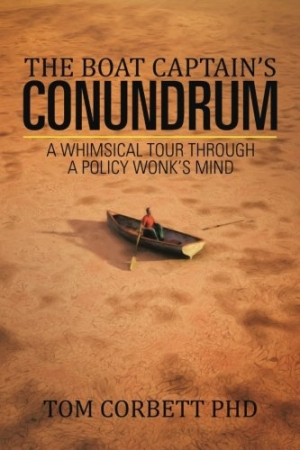The Boat Captain's Conundrum
A Whimsical Tour Through a Policy Wonk's Mind
The Boat Captain’s Conundrum is a breezy sail through public policy with a knowledgeable captain.
Tom Corbett’s The Boat Captain’s Conundrum is a winning performance. It tackles hard questions about social policy development and application in a charming and understandable manner.
The book is inspired by a version of a familiar high-school math problem: A boat is going east in a river at fifteen miles per hour while the river is flowing west at ten miles per hour. How long will it take the boat’s captain to eat his lunch?
The answer offered by Corbett is “Who cares!” because the problem, as stated, is asking the wrong question. Hence, the necessary attributes of a policy wonk: think imaginatively, and ask and research the right questions.
Corbett begins his tour with a lengthy prologue in which he explains what the book is not: “This work is not a text on public policy. It is not a manual for doing policy work.” Nor is it, he says, a polemic for advancing a specific ideological agenda. Rather, Corbett explains, it is a memoir that examines how a policy wonk thinks about what he describes as the “wicked issues.” These are the social issues “where the very underlying question is contentious, available theories are conflicted, causal paths are uncertain, policy ends are vague … and the available research … ambiguous at best.” These wicked issues are tough, but they also make policy work thrilling and rewarding.
One issue Corbett examines is the magnet theory: the belief that if state A is paying a higher welfare benefit than state B (a neighboring state), then large numbers of people will migrate from state B to state A. After a great deal of analysis and discussion, the conclusion is, at best, inconclusive.
To expand and buttress his arguments, Corbett draws liberally on his earlier books, often quoting significant passages, with—all modesty aside—the belief that they are the best sources to reinforce points.
Each chapter begins with a quote from such varied sources as Plato and Oscar Wilde. Consistent with this lighthearted approach, Corbett ends the book with an apt quote from Star Trek’s Mr. Spock: “‘The needs of the many outweigh the needs of the few, and the one.’” Corbett partially attributes his success to his ability to approach research and policy problems with creativity and humor. These are the exact qualities Corbett says all policy wonks need.
The Boat Captain’s Conundrum is a breezy sail through public policy with a knowledgeable captain. It will appeal to experienced voyagers as well as cautious landlubbers.
Reviewed by
John Senger
Disclosure: This article is not an endorsement, but a review. The publisher of this book provided free copies of the book and paid a small fee to have their book reviewed by a professional reviewer. Foreword Reviews and Clarion Reviews make no guarantee that the publisher will receive a positive review. Foreword Magazine, Inc. is disclosing this in accordance with the Federal Trade Commission’s 16 CFR, Part 255.

